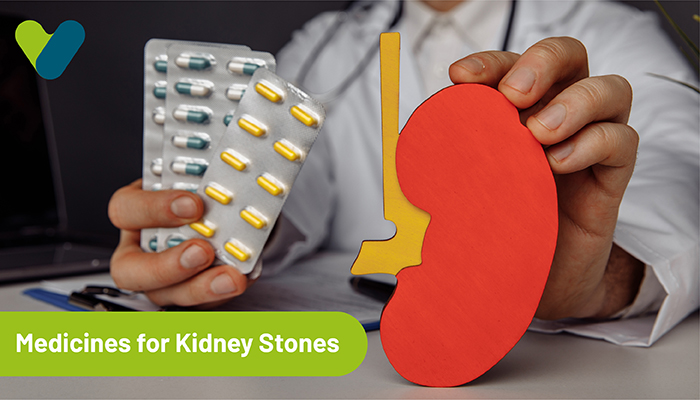Renal calculi, or kidney stones, are solid masses composed of crystals. Typically, kidney stones originate in the kidneys. However, they may form anywhere in the urinary system, including the kidneys, ureters, urinary bladder, and urethra. The aetiology of kidney stones varies depending on the kind of stone. Not every kidney stone is composed of the same crystals or oxalates.
Kidney stones come in the following forms: Calcium stones: Calcium stones are a common condition and prevalent across the world. They are often composed of calcium oxalate, although they may also be composed of calcium phosphate or maleate. Eating fewer meals high in oxalate may minimise the likelihood of forming calcium stone. Foods high in oxalate include spinach, potato chips, nuts & nut products, and chocolate. Also, taking excessive amounts of calcium supplements, particularly when not with a meal, may cause the production of stones. Individuals susceptible to stone are advised to take calcium supplements with a meal and must check their stone condition regularly. It is essential to know that although some kidney stones are composed of calcium, consuming sufficient calcium from whole foods or natural sources may prevent stone formation.
Uric acid: Stone formed with uric acid is another common kind of kidney stone. People with gout, diabetes, obesity, and other metabolic syndromes may develop them. The stone forms when urine is acidic. Foods high in purines may enhance the acidity of urine from a reliable source. Purine is an odourless chemical found in animal proteins like meat, fish, and shellfish.
Struvite stones: The form of stone is especially prevalent in patients with urinary tract infections (UTIs). Stones of this size might induce urinary blockage. A kidney infection causes struvite stones. By determining the underlying infection and treating it can prevent struvite stones.
Cystine crystals: The category of crystal kidney stone is the least common. Individuals with the hereditary disease cystinuria have similar symptoms. With this form of kidney stone, cystine, a naturally occurring acid, seeps from the kidneys and passes into the urine.
General medicine for stones
Kidney stones can be a painful condition, but they seldom cause any long-term damage if diagnosed and treated promptly. Smaller kidney stones may cause pain until they are passed in the urine, usually within two days.If you have a kidney stone disease, your physician can prescribe the following kidney stones medicine:
• Fresh water & juices are good medicines: Examine the colour of your urine. Urine should be light in colour; if it is dark, you are not drinking enough water. Maintaining this fluid intake may be suggested to prevent the creation of new stones. Other good alternatives are coconut water, and, fresh lemon and lime juices. Cranberry juice is also very beneficial for facilitating the treatment of urine infections naturally.
• Apple cider vinegar: The acetic acid in apple cider vinegar helps breakdown kidney stones. In addition to detoxifying the kidneys, apple cider vinegar can alleviate the pain induced by kidney stones.
• Reduce pain: A physician may give nonsteroidal anti-inflammatory kidney stone pain relief meds, such as ibuprofen, for pain reduction in the treatment of kidney stones in healthy people with no medical history.
• Manage nausea and vomiting: Nausea and vomiting are symptoms that may be managed with medication. Although, it is possible to avoid anti-nausea medicine for stones by drinking huge quantities of water throughout the day.
• Alpha-blockers: In this form of renal stone therapy, alpha-blockers assist to relax your muscles in your ureter, making it easier and less painful to pass the kidney stone. Tamsulosin is an example of an alpha blocker, which doctors can also combine with dutasteride. Note: Taking certain medicine for stones might raise the risk of kidney failure, especially in people with a history of renal illness and comorbidities including diabetes, hypertension, and obesity.
Medication Pain relief for managing kidney stones may require medications. Also, the presence of infection requires treatment with antibiotics. The section has a list of generic names of the drugs used for the treatment of kidney stones or renal stones.
The following list can provide readers with a snapshot of some of the more common and relevant drugs:
Meds for pain • Pain: paracetamol, ibuprofen, acetaminophen and naproxen sodium are common kidney stone pain relief tablets.
Meds for stone prevention
• Uric acid stones: Allopurinol, and in some cases allopurinol with an alkalizing agent. Allopurinol also reduces high uric acid levels in the blood. • Calcium stones: Thiazide diuretics or a phosphate-containing preparation. Other drug options are Tiopronin, which is a chelating agent for preventing kidney stone formation. • Urine to be less acidic: Sodium bicarbonate or sodium citrate • Antibiotics: Doctors, in some instances recommend the long-term administration of low or intermittent dosages of antibiotics. Depending on your medical history, your physician may advise you to take an antibiotic before and after surgery to treat kidney stones.
This too shall pass through Kidney stone pain is the most excruciating ache imaginable. Although kidney stone pain relievers have adverse effects, they provide instant and lasting relief. Consult a nephrologist for kidney stone pain if you are searching for a remedy for kidney stone pain relief medications. Taking any drug without doing extensive research and consulting an expert may result in kidney stone discomfort. Kidney stones occur due to an unhealthy or an extreme diet, lifestyle, dehydration, urine concentration, and family history. You can dissolve kidney stones by altering your food and lifestyle. Discuss your diet, natural cures for kidney stones, and the steps you are taking to eliminate kidney stones with your doctor.
